Is there any way to generate assembly code from C# code? I know that it is possible with C code with GAS, but does anybody know if it's possible with C#?
-
I am unclear what you are asking. Do you want to compile your C# to assembly or do you want to write a C# program that outputs assembly? – perelman Feb 12 '12 at 07:44
-
I want to view how my C# code looks in assembly. For educational purposes. Taking an Assembly class right now. – dsta Feb 12 '12 at 07:46
4 Answers
You can use BenchmarkDotNet with the printAsm flag set to true.
[DisassemblyDiagnoser(printAsm: true, printSource: true)] // !!! use the new diagnoser!!
[RyuJitX64Job]
public class Simple
{
int[] field = Enumerable.Range(0, 100).ToArray();
[Benchmark]
public int SumLocal()
{
var local = field; // we use local variable that points to the field
int sum = 0;
for (int i = 0; i < local.Length; i++)
sum += local[i];
return sum;
}
[Benchmark]
public int SumField()
{
int sum = 0;
for (int i = 0; i < field.Length; i++)
sum += field[i];
return sum;
}
}
- 5,737
- 3
- 47
- 66
C# is normally compiled to the .NET bytecode (called CIL or MSIL) and then JIT ("Just In Time") compiled to native code when the program is actually run. There exist ahead of time compilers for C# like Mono's AOT, so you could possibly compile a C# program through one of those and then disassemble it. The result is likely to be very difficult to follow.
More likely, you may want to look at the bytecodes which are somewhat higher level than a CPU's assembly code, which you can do by using ILdasm on a compiled .exe of a C# program.
- 1,747
- 14
- 25
C# code compiles into MSIL (MS Intermediate Language) which is actually not really asm-code you get from C compiler. Read more about about how .NET Framework applications run.
If you want to look at generated IL code see this question.
- 1
- 1
- 5,106
- 2
- 24
- 25
